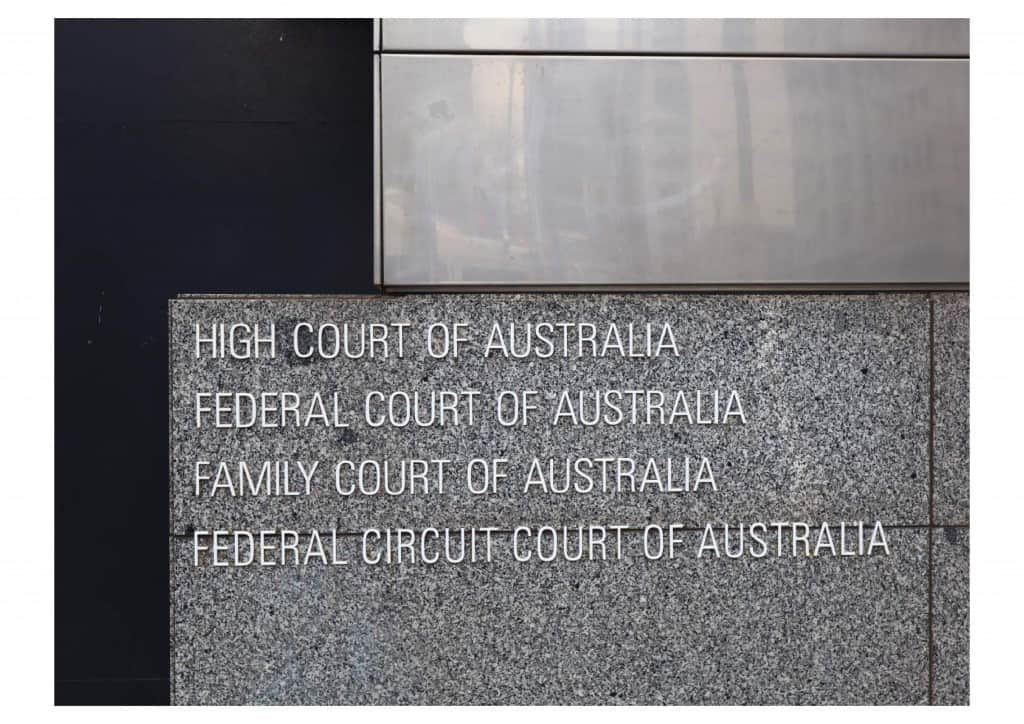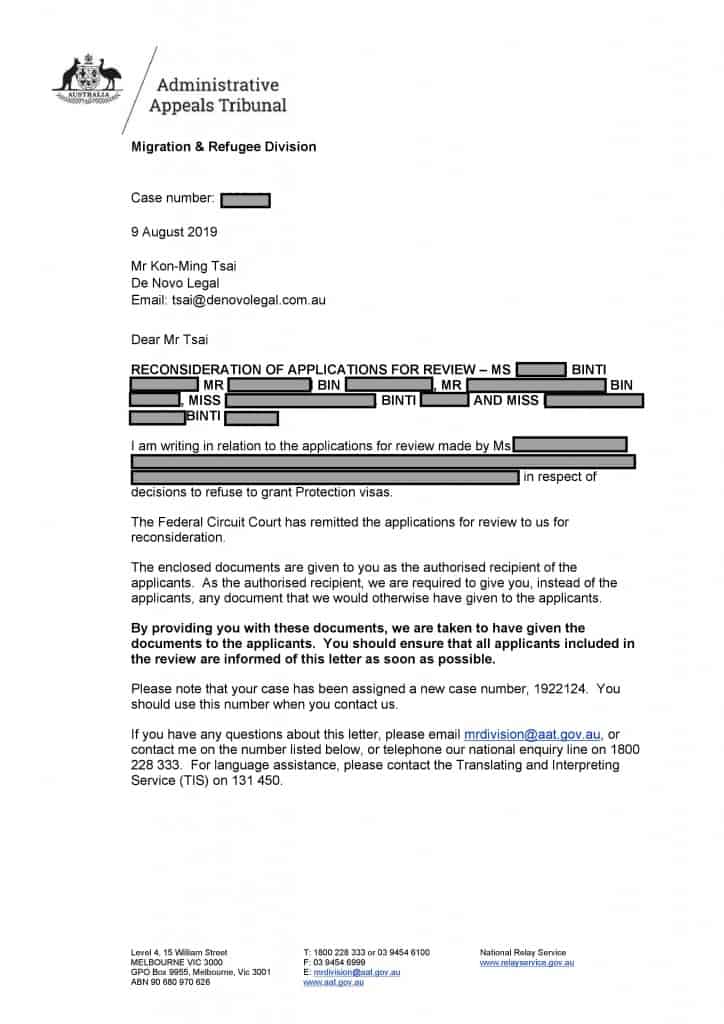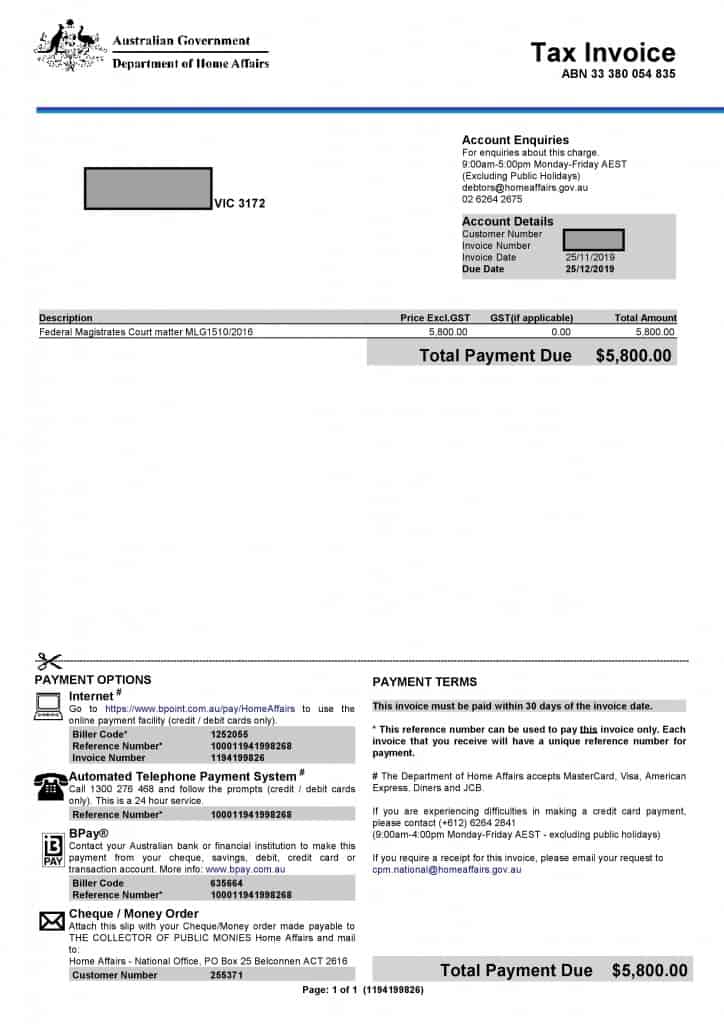
All you need to know about appealing AAT Decision to Court (FCC)
Appealing AAT Decision to Court – you can appeal AAT Decision to Court if the Administrative Appeals Tribunal affirmed, that is, agreed with Department of Immigration (Department of Home Affairs) decision to refuse your visa application or to cancel your visa. You can apply to the Federal Circuit Court or FCC if the decision is affected by jurisdictional error.

When to apply?
Deadline for appealing AAT decision to Court
Generally you have 35 days from the AAT decision to appeal to the FCC (click here to learn more). However, if you are holding a Bridging Visa A (click here to learn more) you should lodge your application within 28 days of the AAT Decision.
If you are appealing AAT decision and lodge your application after 35 days you will need to ask the Court to grant you an extension of time. You will need to explain why you are not able to lodge the application within 35 days of the AAT decision. The Court will usually grant you an extension if your application has reasonable prospect of success and why it is necessary in the interest of the administration of justice to extend you time.
In Fualau v Minister for Home Affairs [2020] FCAFC 11, the Court said that they would have extended time as it was a short delay and circumstances that caused the delay, in this case Fualau was in immigration detention and he has asked the officer to fax his application but could not be faxed due to a faulty machine. Fualau’s request for an extension of time was refused because his appeal lacks merit.
You may have to apply for a new Bridging visa to allow you to remain in Australia until your case is decided (click here to learn more about bridging visas)
What can you ask the Court to do for you?
In your application appealing AAT decision, you could ask the Court to:
- quash the AAT decision; and/or
- a declaration that the AAT decision is unlawful and void; and/or
- stop the Minister from removing you from Australia; and/or
- request the Minister to pay your costs of appealing the AAT decision
In your application appealing AAT decision, you must state the ground(s) of your application. What this mean is, what error of law has the AAT made. You must also state the particulars or where did the AAT made the error(s).
What is error of law?
The technical term for error of law is jurisdictional error. The AAT decision falls into jurisdictional error if the Member (the independent decision maker who presided over your AAT hearing):
- identified a wrong issue; and/or
- asked the wrong question; and/or
- ignored relevant material; and/or
- relied on irrelevant material; and/or
- applied policy inflexibly; and/or
- failed to consider whether to exercise a discretion; and/or
- failed to understand or correctly applied a legislative test; and/or
- failed to provide you with procedural fairness; and/or
- was biased against you; and/or
- failed to make a simple enquiry; and/or
- the decision was legally unreasonable.
The jurisdictional error must be in such a way that the exercise or purported exercise of the Tribunal power is affected by an error of law. The AAT decision is said to have exceeded its authority or it failed to exercise the authority or power given to it under the Migration Act 1958. However, it is your responsibility to establish jurisdictional error in the Tribunal decision. Sometimes if it more difficult to find jurisdictional error where the state of satisfaction, and the power to grant the visa, is conditioned upon the decision-maker reaching an opinion or state of satisfaction.
In your application you must identity what is the type of error made by the Tribunal and you must provide “particulars” of where the error was made. You have to provide the particulars to make your ground meaningful otherwise your application could not succeed. You cannot ask the Court to review the Tribunal’s decision simply because you did not agree with the decision. In another word, the Court is not permitted to conduct a merits review of the Tribunal’s decision. The Court can only conduct judicial review and not merits review.
In summary, the AAT must give your application and evidence proper, genuine and realistic consideration before handing down the AAT decision. The presiding Member must engage in an active intellectual process directed at your application. However, the Court cannot engage in merits review of the AAT decision. Court cannot cross the line between judicial and merits review when determining if a jurisdictional error has occurred, especially where the Tribunal has made a subjective discretionary decision.
It is important that you tell the Tribunal why you should be granted the visa or why your visa should not be cancelled. The Tribunal is required to consider all of your claim, if not, the Tribunal may have made a mistake and you can appeal the refusal to the Court (click here to learn more).
What happen after filing an application?
You should engage an immigration lawyer to help you draft your application as it is often very difficult to correctly identity the jurisdiction error, if any, made by the AAT.
After filing your application, the Court registry will give you a document stating the date of your directions hearing (your first hearing date). You will need to apply for a Bridging visa as the Bridging visa you have been granted when you last applied for the substantive visa expired 35 days after the AAT Decision was made.
In some situations, the Minister’s lawyers will inform you that they will seek to have your appeal dismissed and seek costs from you. They will ask the Court to direct you to show cause why your appeal should not be quickly dismissed.
Show cause hearing
At a hearing of an application for an order to show cause (rule 44.12 of the FCC Rules), the Court may:
- if it is not satisfied that your application has raised an arguable case for the relief claimed, dismiss the application; or
- if it is satisfied that your application has raised an arguable case for the relief claimed, adjourn the hearing and order the Minister to show cause at a final hearing why an order for the relief claimed should not be made on the grounds mentioned in your application or specified by the Court; or
- without making an order under (b) above, make final orders in relation to the claims for relief and grounds mentioned in your application.
Hence, in the context of a show cause hearing, you will have to satisfy the Court that you have a reasonably arguable case that the AAT had made a material error. In assessing whether you have an ‘arguable case’, the Court could only assess whether it is at least arguable that there was jurisdictional error in the Tribunal’s decision (Kader & Anor v Minister for Immigration & Anor [2020] FCCA 880 at [30]). In a migration decision, the most commonly categories (but are not limited) are:
a). the decision-maker identifies the wrong issue or asks the wrong question
b). the decision-maker ignores relevant material
c). the decision-maker relies on irrelevant material
d). the decision-maker fails to follow mandatory procedures]
e). the decision-maker shows actual or apprehended bias; and
f). the decision is illogical, irrational or unreasonable.
The Court has a discretion to dismiss your application. You may challenge this decision if you are able to identify an appealable error. In short, the primary Judge acted upon a wrong principle, allowed extraneous or irrelevant matters to guide or affect him, mistook the facts, did not take into account some material consideration or had reached a result that was simply unreasonable or unjust.
After the directions hearing, the Court will allocate a date for your final hearing. You will be required to provide written submissions and a list of authorities, that is, cases, and legislation you will be relying to argue your case.
Attending scheduled hearing
If you do not attend scheduled hearing, including the Directions hearing, the Court Registrar can dismiss your application for review. And you will be ordered to pay the Minister’s costs. To reinstate your case, you will have to file an Application in a Case.
Reinstating hearing
The Court will consider your application to reinstate your case by considering whether it would be in the interests of justice to set aside the orders to dismiss your case. The Court will consider the following factors in deciding whether to exercise its discretion:
- whether there was an adequate reason for your non-appearance
- whether there was delay in making the application to set aside the orders to dismiss your case
- whether there is any prejudice to the Minister in reinstating your case that could not be adequately compensated for by an order for costs; and
- whether you have a reasonable arguable prospect of success on your substantive application
For eg, in Bhatt v Minister for Home Affairs & Anor [2020] FCCA 1108, Blake J said at [18] Mr Bhatt did not attend the Directions hearing because he was having psychologically issues and provided a Report written by his Psychologist. However, there is nothing in the Report indicates that Mr Bhatt’s condition was acute, or more importantly, acute on or around the day of the Directions hearing. And there was nothing in the Report to indicate that Mr Bhatt was prevented from attending, or was rendered unable to attend, Court on that day because of his condition. Blake J concluded that Mr Bhatt may have been or is suffering from anxiety and depression, but it was not such that it prevented him from attending the Direction hearing.
Particularising the grounds for review
When you lodge an application to appeal the AAT decision to the FCC, you must identity the type or kind of error(s) of law made by the Tribunal. You must also particularise where that error occurred. If you do not particularise the grounds, the failure to particularise is sufficient for the Court to dispose of your application.
Your grounds cannot be a complaint that you do not like how the AAT has made its decision as the FCC cannot undertake a merits review of the AAT’s decision. Similarly, you cannot challenge the manner in which the AAT weighed your evidence as weight is a matter for the Tribunal.
Not following Policy (PAM3) a ground for review?
The Department has issued what is commonly known as PAM3 Policy to help administrative decision-maker in making visa related decision. So, can you claim that the AAT did not follow PAM3 Policy amount to jurisdictional error? No, PAM3 Policy or any other Policy is not a binding document and is no more than a procedural and policy guideline to decision-maker applying the Migration Act and the Migration Regulations (El Ess & Anor v MIMIA [2004] FCA 1038).
PAM3 does not have the effect of a direction made under s 499 which would bind the decision-maker having functions or power under the Migration Act as to the performance of those functions or the exercise of those powers.
What if your agent has made errors and mistakes?
Unless the errors and/or mistakes amount to fraud, your agent’s mistakes or errors will amount to no more than negligence or incompetence. In addition, even if your agent is either negligence or incompetence, you can raise your concerns with the Office of the Migration Agents Registration Authority and not the Court.
Can the Court grant you a visa?
The FCC cannot review the merits of the AAT’s decision or grant you the visa you seek. The role of the FCC is to determine if the Tribunal made a material error in arriving at the decision it arrived: MIEA v Wu Shan Liang (1996) 185 CLR 259 at 272.
Self-represented
If you are not legally represented, the Court has to remain astute and alert to any possible error in the AAT’s decision: MZAIB V MIBP [2015] FCA 1392. What this mean is that the Minister will usually assist the Court with identifying any errors not identified and not raised by self-represented litigant.
For e.g. in Samah v Minister for Immigration & Anor [2020] FCCA 2868, the Minister advised the Court that the Tribunal adopted the Department’s decision without the required level of analysis and, in so doing, failed in its (Tribunal’s) statutory duty to review the Department’s decision. The Court agreed that the Tribunal’s conclusion is based on its assessment that the Department’s reason. The Court said (at [73]) that the Tribunal’s findings do not amount to an active consideration of the issue at hand – an active consideration that is required before it can be concluded that the visa should be cancelled. In short, the Tribunal failed to exercise its jurisdiction. It did not comply with its statutory duty to review the Department’s decision.
Futility
Sometimes the Court may not remit the matter back to the Tribunal even if the Court finds the Tribunal had committed an error of law. For e.g. if your Subclass 482 visa required you to work for the employer who sponsored you but your sponsor’s business ceased and you are unable to find another employer to sponsor you. As you no longer work for your sponsor, you are in breach of Condition 8107 and you are unable to find another sponsor. The Court may, in this situation, will find it futile to send your case back to the Tribunal.
In another example, the Court may not remit your case back to the Tribunal because your visa has already expired even though under sections 37A, 133 and 134D of the Migration Act, the Minister can extend the period in which a visa is in effect.
In Patel v Minister for Immigration & Anor [2014] FCCA 2000 and Makwasa v Minister for Home Affairs & Anor [2018] FCCA 1179, the Court found where the student visas under review had expired, it would be an exercise in futility to grant relief as any relief would have no practical consequence.
Appealing Federal Circuit Court’s (FCC) decision to Federal Court of Australia (FCA)
In the event the FCC dismissed your application against the AAT’s decision, you may appeal the FCC’s decision to the FCA.
Usually at the FCA you may not raise a ground not previously raised at the FCC because it is important to the due administration of justice that the substantial issues between you and the Minister and AAT are ordinarily settled at the trial (Coulton v Holcombe (1986) 162 CLR 1 at 7). However, the FCA may allow you to raise a new ground where it is expedient and in the interests of justice and where the new ground could not have been met by calling evidence and would not have resulted in the case being differently conducted (Water Board v Moustakas (1988) 180 CLR 491 at 497). The FCA may grant you leave to raise a new ground if it clearly has merit and there is no real prejudice to the Minister and AAT (VUAX v MIMIA (2004) 238 FCR 588 at [48]). Furthermore, in cases involving the removal of persons from Australia on character grounds or in refugee cases, an adverse decision may have very serious consequences for the appellant (Iyer v MIMIA [2000] FCA 1788 at [22]).
If you are raising a new ground not previously raised in the FCC, your new ground must have merit because it is generally likely in the interests of the administration of justice when an administrative decision (such as the AAT’s) is capable of resulting in a deprivation of liberty (ie, detained or deported for not holding a valid visa): ARK16 v MIBP [2018] FCA 825 at [25]. In short, your proposed new ground must have a reasonable prospect of success (Fualau v Minister for Home Affairs [2020] FCAFC 11 at [17]).
Costs follow the event
As a general rule of thumb, the loser in the case is required to pay the winner’s costs.

Successful FCC appeal

Unsuccessful FCC applicant is required to pay $5,800 to the Department
If the Federal Circuit Court accepts that the AAT has made an error of law in determining your visa application refusal or visa cancellation, the Judge will remit your case back to the AAT for re-determination according to law.
Your case will be re-allocated to a Member, for example, a new Member who was not involved in your initial case. The Member may:
- seek further information; and/or
- seek your comments or response to particular information; and/or
- invite you to attend a hearing; and/or
- make a decision.
Australian migration law is complex and difficult to understand, contact our immigration lawyer for a consultation (fee applies) regarding appeal AAT decision (click here to learn more about immigration lawyer). You may also refer to our FAQs for answers regarding visa application or visa cancellation by clicking here.

 041 222 4020 or WeChat: AUDvisa
041 222 4020 or WeChat: AUDvisa
This article is not intended to be or taken as migration legal advice. The author of this article disclaims any liability for any action or omission on the information provided or not provided in this article. You should always consult an immigration lawyer or a registered migration agent to form an informed opinion on your immigration matter.



